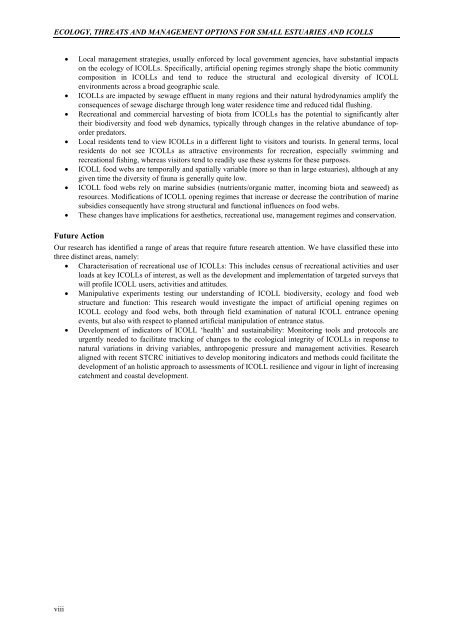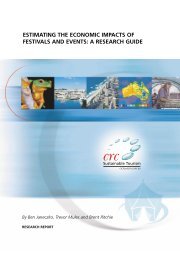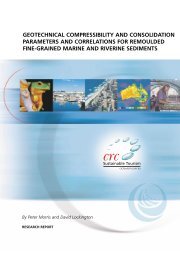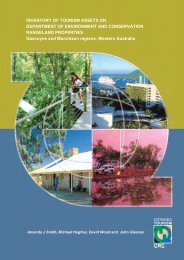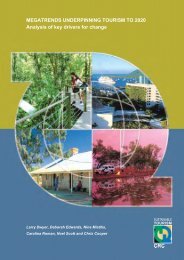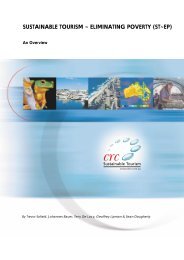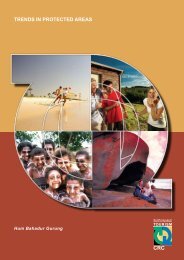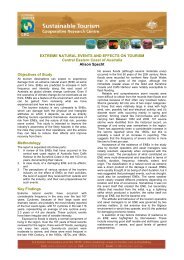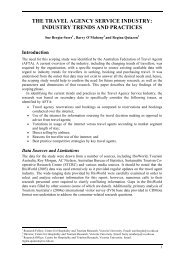icolls - Sustainable Tourism CRC
icolls - Sustainable Tourism CRC
icolls - Sustainable Tourism CRC
Create successful ePaper yourself
Turn your PDF publications into a flip-book with our unique Google optimized e-Paper software.
ECOLOGY, THREATS AND MANAGEMENT OPTIONS FOR SMALL ESTUARIES AND ICOLLS<br />
viii<br />
• Local management strategies, usually enforced by local government agencies, have substantial impacts<br />
on the ecology of ICOLLs. Specifically, artificial opening regimes strongly shape the biotic community<br />
composition in ICOLLs and tend to reduce the structural and ecological diversity of ICOLL<br />
environments across a broad geographic scale.<br />
• ICOLLs are impacted by sewage effluent in many regions and their natural hydrodynamics amplify the<br />
consequences of sewage discharge through long water residence time and reduced tidal flushing.<br />
• Recreational and commercial harvesting of biota from ICOLLs has the potential to significantly alter<br />
their biodiversity and food web dynamics, typically through changes in the relative abundance of toporder<br />
predators.<br />
• Local residents tend to view ICOLLs in a different light to visitors and tourists. In general terms, local<br />
residents do not see ICOLLs as attractive environments for recreation, especially swimming and<br />
recreational fishing, whereas visitors tend to readily use these systems for these purposes.<br />
• ICOLL food webs are temporally and spatially variable (more so than in large estuaries), although at any<br />
given time the diversity of fauna is generally quite low.<br />
• ICOLL food webs rely on marine subsidies (nutrients/organic matter, incoming biota and seaweed) as<br />
resources. Modifications of ICOLL opening regimes that increase or decrease the contribution of marine<br />
subsidies consequently have strong structural and functional influences on food webs.<br />
• These changes have implications for aesthetics, recreational use, management regimes and conservation.<br />
Future Action<br />
Our research has identified a range of areas that require future research attention. We have classified these into<br />
three distinct areas, namely:<br />
• Characterisation of recreational use of ICOLLs: This includes census of recreational activities and user<br />
loads at key ICOLLs of interest, as well as the development and implementation of targeted surveys that<br />
will profile ICOLL users, activities and attitudes.<br />
• Manipulative experiments testing our understanding of ICOLL biodiversity, ecology and food web<br />
structure and function: This research would investigate the impact of artificial opening regimes on<br />
ICOLL ecology and food webs, both through field examination of natural ICOLL entrance opening<br />
events, but also with respect to planned artificial manipulation of entrance status.<br />
• Development of indicators of ICOLL ‘health’ and sustainability: Monitoring tools and protocols are<br />
urgently needed to facilitate tracking of changes to the ecological integrity of ICOLLs in response to<br />
natural variations in driving variables, anthropogenic pressure and management activities. Research<br />
aligned with recent ST<strong>CRC</strong> initiatives to develop monitoring indicators and methods could facilitate the<br />
development of an holistic approach to assessments of ICOLL resilience and vigour in light of increasing<br />
catchment and coastal development.


